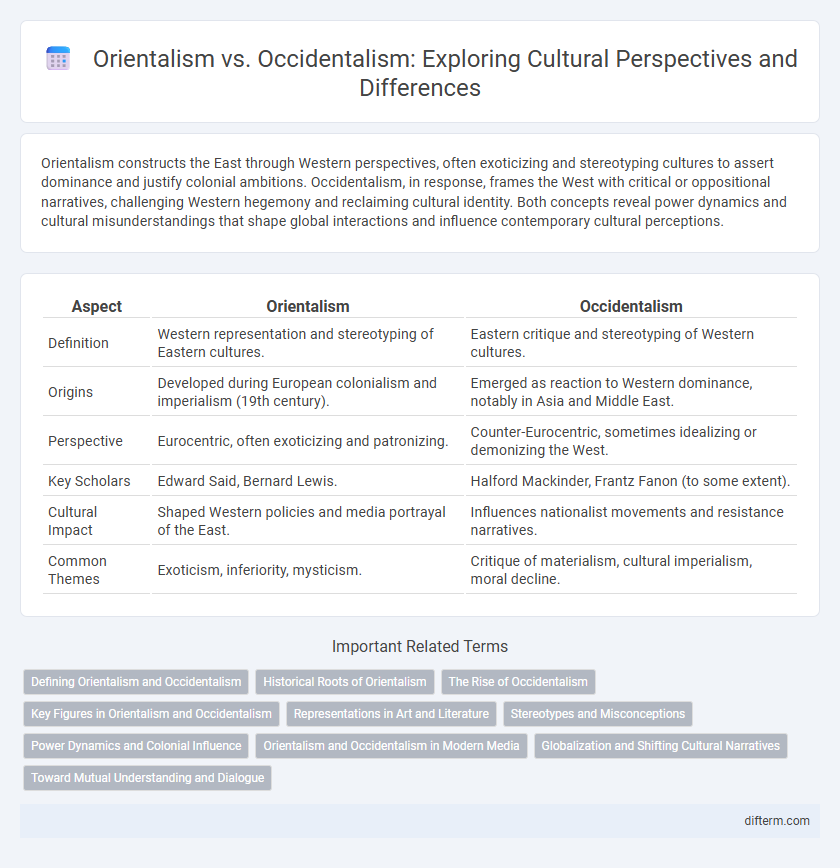Orientalism constructs the East through Western perspectives, often exoticizing and stereotyping cultures to assert dominance and justify colonial ambitions. Occidentalism, in response, frames the West with critical or oppositional narratives, challenging Western hegemony and reclaiming cultural identity. Both concepts reveal power dynamics and cultural misunderstandings that shape global interactions and influence contemporary cultural perceptions.
Table of Comparison
| Aspect | Orientalism | Occidentalism |
|---|---|---|
| Definition | Western representation and stereotyping of Eastern cultures. | Eastern critique and stereotyping of Western cultures. |
| Origins | Developed during European colonialism and imperialism (19th century). | Emerged as reaction to Western dominance, notably in Asia and Middle East. |
| Perspective | Eurocentric, often exoticizing and patronizing. | Counter-Eurocentric, sometimes idealizing or demonizing the West. |
| Key Scholars | Edward Said, Bernard Lewis. | Halford Mackinder, Frantz Fanon (to some extent). |
| Cultural Impact | Shaped Western policies and media portrayal of the East. | Influences nationalist movements and resistance narratives. |
| Common Themes | Exoticism, inferiority, mysticism. | Critique of materialism, cultural imperialism, moral decline. |
Defining Orientalism and Occidentalism
Orientalism refers to the Western scholarly and artistic depiction of Eastern societies as exotic, backward, and fundamentally different, often reinforcing stereotypes and power imbalances. Occidentalism, in contrast, represents Eastern critiques and caricatures of Western culture, highlighting perceived materialism, imperialism, and moral decay. Both concepts reveal how cultural identities are constructed through oppositional narratives that shape geopolitical and social relations.
Historical Roots of Orientalism
The historical roots of Orientalism stem from European colonialism and Enlightenment-era scholarship, shaping Western perceptions of the East as exotic, backward, and fundamentally different. This discourse constructed a binary opposition that justified imperial dominance through cultural and intellectual superiority. Orientalist narratives often ignored the complexities of Eastern societies, reinforcing stereotypes that persisted in art, literature, and academia.
The Rise of Occidentalism
The rise of Occidentalism reflects a critical response in non-Western societies to Western cultural, political, and economic dominance, depicting the West as morally corrupt and culturally alien. This discourse challenges the assumptions of Orientalism by reversing the gaze, portraying Western modernity as a threat to indigenous values and identities. Key examples of Occidentalism emerge in postcolonial literature, political rhetoric, and social movements that emphasize resistance to Western hegemony and promote cultural self-assertion.
Key Figures in Orientalism and Occidentalism
Key figures in Orientalism include Edward Said, whose seminal work "Orientalism" critiques Western depictions of Eastern societies, and Bernard Lewis, known for his extensive scholarship on Middle Eastern history. Occidentalism features thinkers like Ian Buruma, who examines Western stereotypes held by Eastern cultures, and Koichi Hamada, who analyzes Western perceptions in the context of East Asian modernization. These intellectuals shape the discourse by challenging and deconstructing cultural dichotomies between East and West.
Representations in Art and Literature
Orientalism in art and literature often depicts Eastern societies through exoticized and stereotypical lenses, emphasizing mysticism and otherness, as famously analyzed by Edward Said. Occidentalism presents Western cultures as imperialistic or morally corrupt, shaping counter-narratives in Eastern artistic and literary productions. These contrasting representations influence identity formation and power relations, revealing underlying geopolitical tensions and cultural perceptions.
Stereotypes and Misconceptions
Orientalism perpetuates stereotypes by portraying Eastern cultures as exotic, backward, or mystical, reinforcing a binary worldview that simplifies complex societies. Occidentalism similarly generates misconceptions by depicting Western cultures as imperialistic, materialistic, or morally corrupt, fueling reciprocal misunderstandings. Both frameworks contribute to cultural distortions that hinder authentic intercultural dialogue and reinforce prejudiced attitudes.
Power Dynamics and Colonial Influence
Orientalism constructs the East as exotic and subordinate through Western colonial narratives, reinforcing power imbalances that justified imperial domination. Occidentalism, as a counter-discourse, critiques Western cultural arrogance and challenges the hegemonic portrayal of the West as superior. The ongoing tension between Orientalism and Occidentalism reflects deep-seated power dynamics shaped by historical colonial influence and the struggle for cultural self-definition.
Orientalism and Occidentalism in Modern Media
Orientalism in modern media often perpetuates stereotypical depictions of Eastern societies as exotic, backward, or mystical, reinforcing a Western-centric worldview. Occidentalism, conversely, represents Western culture through the lens of Eastern media, sometimes framing the West as imperialistic, materialistic, or culturally superficial. Both frameworks influence global perceptions by shaping narratives that reflect power dynamics and cultural biases in contemporary storytelling and news coverage.
Globalization and Shifting Cultural Narratives
Orientalism and Occidentalism reveal contrasting perspectives shaped by globalization's impact on cultural narratives, where Eastern and Western identities are continuously renegotiated through media, literature, and political discourse. Globalization accelerates cultural exchange and hybridization, challenging fixed stereotypes and fostering more nuanced understandings of both Orient and Occident. These shifting narratives highlight power dynamics and cultural representations that influence international relations and self-perception in a globalized world.
Toward Mutual Understanding and Dialogue
Orientalism, often critiqued for its Western-centric portrayals of Eastern cultures, contrasts with Occidentalism, which reflects Eastern perspectives on the West, both shaping cross-cultural perceptions. Promoting mutual understanding and dialogue requires recognizing these constructed narratives and fostering empathy beyond stereotypes. Engaging in equitable cultural exchanges encourages deeper insight and bridges divides between East and West.
Orientalism vs Occidentalism Infographic

 difterm.com
difterm.com